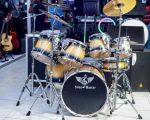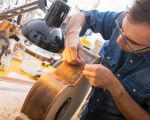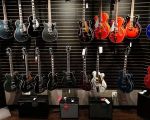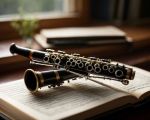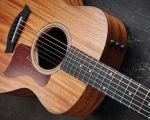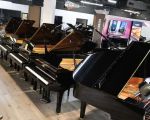Understanding Your Needs as a Musician
When it comes to picking the right music gear, I know it can feel overwhelming. Whether you're a beginner or a seasoned pro, choosing the right gear is critical to your musical journey. Over the years, I've learned that the process isn't just about buying the most expensive or the most hyped-up gear. It's about finding the tools that work best for your style, sound, and goals. Here’s a guide to help you make informed decisions that can elevate your music and bring your creativity to life.
1. Know Your Musical Style and Genre
The first step in selecting the right gear is understanding the type of music you play. Your genre plays a big role in what kind of equipment will suit your needs. For example, if you're a guitarist in a rock band, you’ll likely need a powerful amp and pedals to create the right sound. On the other hand, if you’re an electronic music producer, you’ll be focused on MIDI controllers, synthesizers, and high-quality audio interfaces. Take time to reflect on your musical style before you start shopping.
2. Prioritize Quality Over Quantity
When I first started out, I was all about getting as many gadgets as I could—thinking more gear meant better music. However, I quickly learned that too much gear can lead to confusion and clutter. Instead of filling your studio with every piece of equipment available, prioritize quality over quantity. Invest in a few high-quality pieces that suit your style and needs. For example, a professional microphone for vocals is far more valuable than an entire set of cheap accessories that won’t improve your sound quality.
3. Budgeting: Balancing Cost and Performance
Let’s talk about money—because let's face it, we all have a budget to stick to. Music gear can get pricey, especially if you’re looking at high-end brands. But, here’s a pro tip: you don’t always have to go for the most expensive option to get great quality. There are plenty of mid-range options that offer excellent performance without breaking the bank. Do your research, read reviews, and see if the gear fits within your budget while still delivering the quality you need. Personally, I’ve always found that balancing cost with the right features has led me to some of my best purchases.
Understanding Key Gear Categories
4. Choosing the Right Instruments
If you're a musician, your instrument is your voice. Whether it’s a guitar, keyboard, drums, or any other instrument, picking the right one is fundamental to your sound. For instance, as a guitarist, I spent hours trying different guitars before I found the one that suited my playstyle. It wasn't about the brand—it was about the feel, tone, and comfort it provided me. You want an instrument that makes you feel connected to your music, one that enhances your performance rather than limits it.
5. Amplifiers and Audio Interfaces
For many musicians, the amplifier or audio interface is the bridge between their instrument and the world. If you play electric guitar, an amplifier is essential for projecting your sound. Similarly, for electronic musicians, an audio interface is vital for connecting your instruments to your computer. When selecting these pieces of gear, pay close attention to their power, sound quality, and compatibility with other equipment. I made the mistake of not considering my amp’s wattage and found myself struggling to be heard during gigs. Don’t make the same mistake—find something that fits your needs, whether you’re practicing at home or performing live.
6. Effects Pedals and Sound Modifiers
Effects pedals are where the magic happens for many musicians. Whether it’s creating lush reverb or adding distortion to your guitar tone, pedals can transform your sound completely. However, I’ve learned that not all pedals are necessary for everyone. Before purchasing pedals, think about the sound you want to create. If you’re into heavy metal, a distortion pedal might be a must. If you’re playing ambient music, a delay or reverb pedal could be more up your alley. Start with the basics and only expand your pedalboard once you're comfortable with your setup.
Making the Right Gear Choices for Recording and Production
7. Choosing the Right Software and Audio Tools
In the world of music production, the right software can make all the difference. As someone who loves experimenting with digital music, I’ve spent years refining my DAW (Digital Audio Workstation) setup. Some popular DAWs include Ableton Live, Logic Pro, and Pro Tools. The key is to select one that complements your workflow and fits your creative needs. For example, Ableton Live is fantastic for electronic musicians and DJs, while Logic Pro is perfect for those focused on composition and live recording.
8. Microphones and Studio Monitors
If you're recording vocals, instruments, or podcasts, choosing the right microphone is a crucial decision. A condenser mic might work best for studio vocals, while a dynamic mic is often the go-to for live performances. As for studio monitors, they offer a more accurate sound representation than regular speakers. Over time, I’ve found that investing in high-quality microphones and monitors has drastically improved the accuracy of my recordings. Always listen to your gear before buying it—how it sounds in the room is just as important as the specs on paper.
9. Headphones: A Musician's Best Friend
It’s easy to overlook headphones, but they play a critical role in both performance and recording. I use high-quality headphones when mixing and mastering my music, as they allow me to hear every detail. When shopping for headphones, look for those that offer a flat frequency response to avoid colorating your sound. You want headphones that let you hear the music as accurately as possible, which can be a game-changer during the production process.
Where to Buy and How to Test Gear
10. Online vs. In-Store Shopping
In today’s digital world, you can shop for music gear online from virtually anywhere. However, I strongly recommend testing your gear in person when possible. Music stores are the perfect place to test instruments, amps, and other gear. Feel the guitar, listen to the amp, and get a real sense of the equipment before you commit. If you must shop online, look for stores with generous return policies so you can return items if they don't meet your expectations.
11. Trying Before Buying
One of the best pieces of advice I ever received was to never buy gear without trying it first. If you’re buying a guitar, spend some time playing it in the store to see if it feels comfortable. The same goes for keyboards, drums, and other instruments. The gear you choose should inspire you to play more, not make you feel restricted. Plus, testing equipment firsthand allows you to catch potential issues that you wouldn’t notice from an online description.
12. Renting or Borrowing Gear
If you’re unsure about a particular piece of gear, consider renting or borrowing it before making a purchase. Many stores offer rental options for instruments, amplifiers, and even studio gear. This allows you to try out different models without the financial commitment. I did this when I was deciding on a new synthesizer, and it saved me from buying something that didn’t fit my style. Renting gear is a smart way to make more informed decisions.

